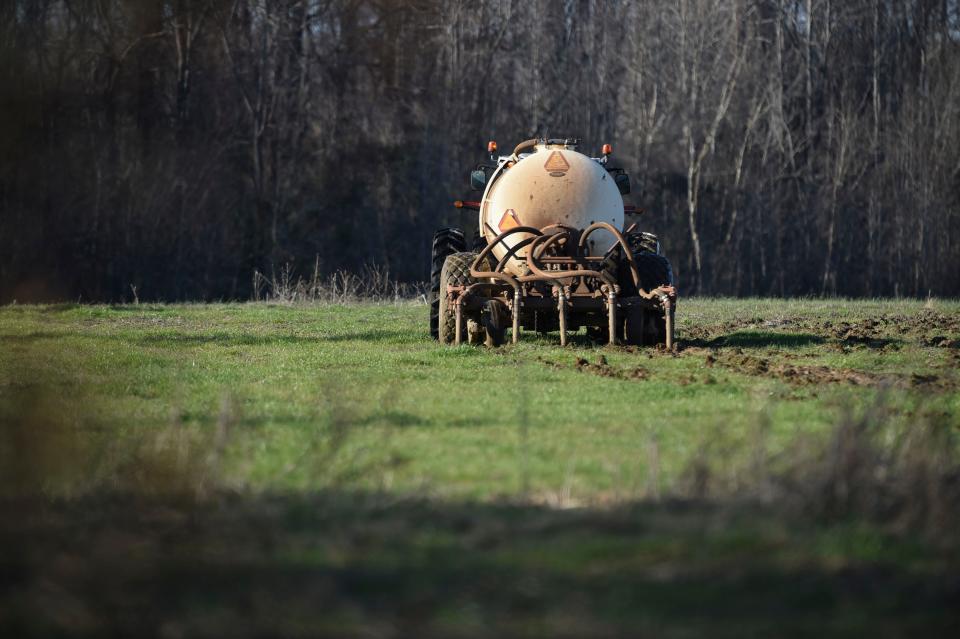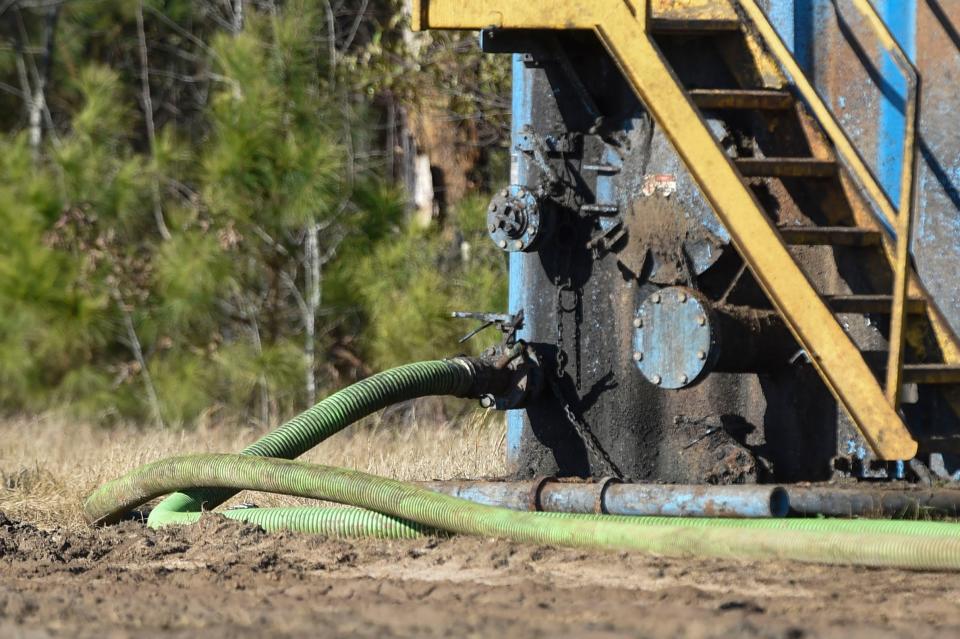With hiked fertilizer costs, some farmers feel the benefits outweigh the risks
For many landowners, the potential drawbacks of applying soil amendment — the smell, the flies, the uncertainty and the angry neighbors — are too much. But others see a golden opportunity: a free replacement for expensive fertilizer.
Bartow, Georgia farmer Joe McKenzie first saw soil amendments advertised on Facebook. Within a few weeks, drivers delivered the product in big blue tanks and began applying it to his fields.
McKenzie estimated the amendments, which he said he got for free, will save his nearly 100-acre cattle ranch between $50,000 and $60,000 in fertilizer costs. After coming down from their record highs last year, fertilizer prices average about $600 to $1,200 per ton, depending on the type.
Fertilizer is designed to introduce nutrients to the soil to promote plant growth, noted the Georgia Department of Agriculture. While soil amendments might contain some beneficial nutrients, such has nitrogen, amendments are designed to improve soil texture, it’s aeration and ability to absorb water.
McKenzie maintains that the amendments are beneficial. He knows of other farmers who have taken it and had positive results. And when it comes down to it, he does not have the money to apply the fertilizer his pastures would need to support the herd he wants to move there.
Going by the book
Last December, Recovered Materials Company LLC (RMC), a soil amendment registrant and transporter, held a virtual town hall meeting for Jefferson County residents. For the last year, RMC has been delivering soil amendments to properties in multiple Georgia counties.
“During that process, we have complied with all state and local rules and regulations,” said Taylor Harbinson, president of RMC. “And we’re proud to say that since receiving our first soil amendment registration all the way back in June 2021, we have operated and received no violations.”

Harbinson joined RMC in August 2022, bringing with him a background in the manufacturing of liquid products for what he calls “some of the largest food service restaurants in the country.”
He said the purpose of the town hall was to explain exactly what RMC does and reassure the community that his operation follows state Department of Agriculture rules and regulations.
“We collect food processing byproducts from our customers and transport those byproducts as soil amendments,” Harbinson said.
The Georgia Soil Amendment Act of 1976 defines such an amendment as any substance intended to change or enhance the characteristics of the soil or growing medium.
“Those characteristics that we look to enhance would be increasing the penetrability of water or air, increasing the water holding capacity, eliminating or decreasing soil compaction and then otherwise altering the soil or growth medium in such a manner that the physical properties are materially enhanced,” Harbinson said.
RMC delivers these amendments to what he calls “product control contractors," who then provide for the storage and land application of the amendments through subsurface injection.
Trusting the system
Farmers like McKenzie and land owners like Al Gunn trust the Department of Agriculture’s registration process and the companies who are producing the amendments.
The Gunn family has been raising beef cows in Jefferson County for almost 200 years. Over the last half century, Gunn said, his family has added all sorts of things to the soil to improve the land. Those additives include chicken litter, City of Augusta sewage and waste from paper plants. Most recently, he applied a cat food plant's washdown — the sudsy liquid used to clean the pet food manufacturing machines. It's the same soil amendment that many other Georgia farmers have received.

Gunn's tenant, another farmer, worked out a deal to spread the amendment on his family's 88-acre property. But Gunn said it was done with his consent. The farmer did not provide them with a lot of details about the agreement, which wasn't a surprise to Gunn.
“I’m an engineer. I get paid to be detail-oriented. That’s what I gravitate to. But I don’t think the general farmer is going to ask for the details and probably doesn’t even care about the details,” he said.
When he asked for it, Gunn saw a chemical analysis of what was in the registered soil amendment. He said it's mostly nitrogen.
"It’s not as potent or powerful as fertilizer,” Gunn said. “But fertilizer, as (expensive) as it is, you can’t afford to put it out. So you’re faced with putting this free stuff out that’s not as good as fertilizer, but it’s free, versus putting nothing out.”
“According to the United States Department of Agriculture, fertilizer makes up about 33% of all farmers’ operating costs,” said John Monroe, RMC’s VP of Recyclables. “Soil amendments offer a low cost, readily available alternative to traditional fertilizers.”
Fertilizer costs, he said, increased 30% in 2022 following an 80% increase in 2021.
Monroe argues that RMC, and other companies like it, support the state’s food industry, which he calls Georgia’s largest economic engine, by recycling its byproducts, supporting the economy and keeping food prices low.
What about the cons?
The amendments were spread on both Gunn's family farm and McKenzie’s pastures for about 10 days. Both said that while it did smell, the aroma was mostly gone three weeks later.
Gunn said that while he can sympathize with neighbors to these applications where the tractors and tanks have stayed for over a month, he still takes issue with some who have called it “toxic industrial waste,” terms he feels opponents use as a scare tactic.
“Well, if you look at the textbook definition, they are correct,” Gunn said. “It is toxic in that there is toxic biological growth in there — E. coli and other bad, nasty bacteria. If you take water out of Briar Creek and set it in the sun for two weeks it’s going to be toxic. But don’t mischaracterize and scare people.”
USA Today Network reporters Marisa Mecke, Abe Kenmore and Nikolai Mather contributed to this article.
This article originally appeared on Augusta Chronicle: Hikes in fertilizer costs lead some farmers to use soil amendments

